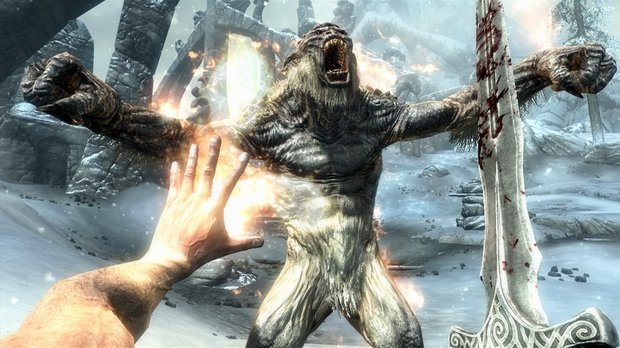High Horse: Save yourself by not saving your game
Games are more fun when you don’t have a constant safety net

High Horse is a rotating opinion column in which GamesRadar editors and guest writers are invited to express their personal thoughts on games, the people who play them and the industry at large.
You’re ruining your Skyrim game. No, really. You’re playing it wrong. Trust me.
I can see it now. You load up your character, set off into this vast new world. You spot someone that you’re going to have a conversation with. So you save your game. When the conversation doesn’t go the way you wanted it to, you reload that save and give it another shot. This time, you succeed in getting what you want. Satisfied, you move on.

You spot a dragon. Before it burns you to a crisp, you flip open the options menu and save your game. It burns you to a crisp. You reload and try again. This time, you survive for a couple minutes before you’re burned you to a crisp. You reload again. Finally, after a marathon fight, you’re able to take him down. Feeling like you’ve accomplished something, you head back to town to lick your wounds.
Here’s the problem with these scenarios: None of what you just did means anything. Your decisions hold no weight. Every time you time-travel, you’re undermining your own experience. If these open-world games allow for each player to experience his or her own story, his or her own world, then that means that player has to be willing to let the game do that. What that means is that players have to allow for failure.
This is why open-world games with branching choices tend to lose me. The very possibility of going back and changing the result of some huge decision makes that decision feel trivial and unimportant.
Let’s think about the traditional hero’s journey (or monomyth, if you’re feeling fancy) for a moment. In Joseph Campbell’s The Hero with a Thousand Faces, he argues that each character, in order to truly become heroic, must proceed through a series of trials. Often, these figures fail at least one of the tasks. It adds drama, creates imperfect and believable characters, and generally improves the reader’s (or viewer’s, or player’s) connection with the character.
Sign up to the GamesRadar+ Newsletter
Weekly digests, tales from the communities you love, and more
So what if, say, Peter Parker had stopped the thief that ended up killing Uncle Ben? Or what if Luke Skywalker had succeeded in suppressing his desire for revenge in The Empire Strikes Back? Slight geek pandering aside, these characters would not have been nearly as interesting had they acted perfectly throughout their road to heroism. Nor would they have been terribly believable.
Why don’t we want to go through the same transformation? Is our obsession with seeing all the content in our game worth sacrificing what could be a powerful narrative with a compelling lead character?
Creating multiple save files is equally undermining. There’s no value in the outcome of a difficult situation if you’re able to see all possible results. As soon as a player realizes that the result of their actions is the only one they’re going to get, then all of a sudden their actions mean something. They carry serious weight.
One of the biggest criticisms of L.A. Noire is that, upon failing an interrogation, players often missed large chunks of the story. Critics condemned the practice as unfair to the player and a huge problem with the way that the game told its story. Personally, I’d love to see that concept expanded upon. If you fail to attain the proper information to apprehend the truly guilty criminal, there should be consequences. Granted, L.A. Noire’s method of levying those consequences was fairly haphazard, but if the concept had been allowed to flourish, it could have resulted in enormously intense situations. Let’s embrace the idea of games punishing players for failure, not run from it.
Recently, Dark Souls got it right. Sure, you can create multiple save files, but there’s no chance to have those files branch. Any time anything is attained or lost, the game automatically overwrites the current save file. So if you screw up and lose those 30,000 souls you were carrying around, tough luck. Sure, it may make you want to throw your controller through the nearest window, but you’ll certainly do your best to make sure it doesn’t happen again, won’t you?
The best solution I can come up with to fix this little problem is for developers to stop allowing multiple save files and quick saves. The very presence of these options cheapens the experiences that they’re working so hard to create. It doesn’t matter that one could simply ignore the ability to erase decisions made and change their ultimate results. Only when players are forced to live with their choices will their stories begin to matter.
Taylor Cocke is a freelance games critic who resides in Oakland, CA. He's written for Official Xbox Magazine, Joystiq, Playstation: The Official Magazine, 1UP, and a slew of others. He drinks way too much coffee. Follow him on Twitter @taylorcocke. He promises not to quote Kids in the Hall too much.



